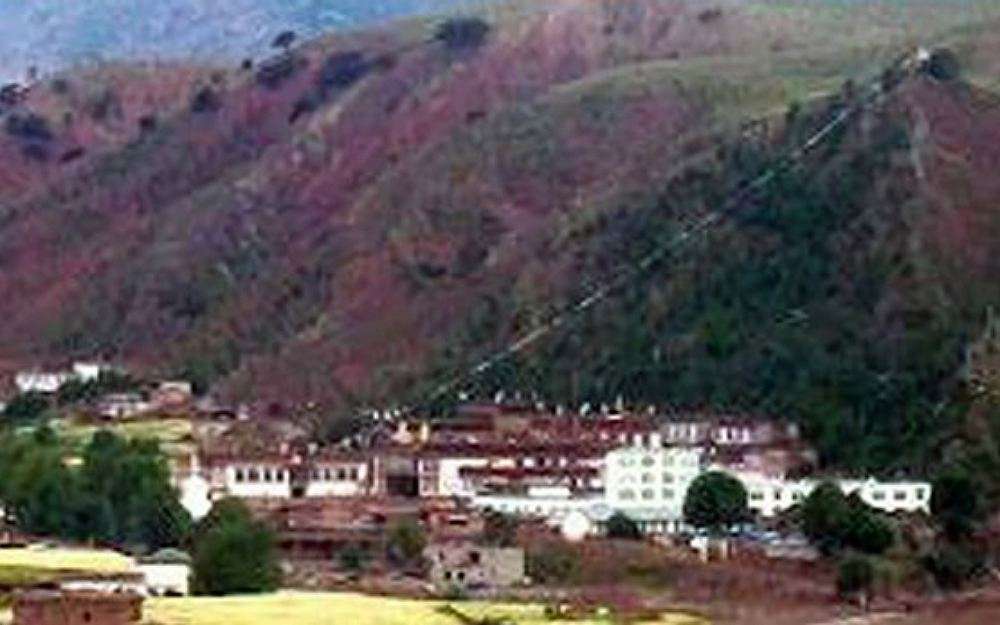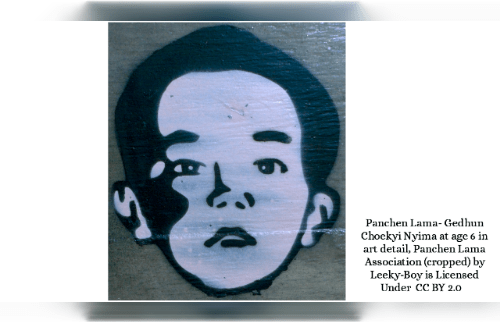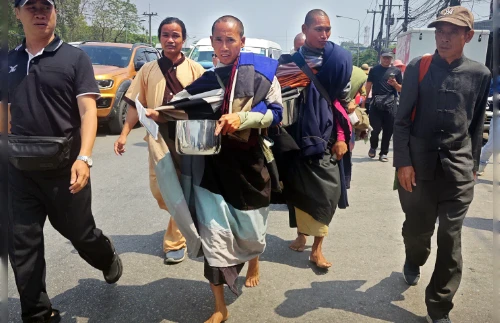The move reflects China’s tightening grip on religious activities, sources say.
By Pelbar and Tenzin Pema for RFA Tibetan

Credit: Citizen journalist Via RFA
Chinese authorities have forbidden the admission of new monks of all ages into a Tibetan Buddhist monastery in Chamdo prefecture in eastern Tibet amid growing restrictions on religious activities in the country, two sources familiar with the development told Radio Free Asia.
This is the first time Chinese authorities have prohibited the enrollment of monks of all ages, though previously only minors, or those below the age of 18, were restricted from joining the monastic order in Tibet, said a source from inside the region.
“Now, authorities have issued an order forbidding the intake of any new monks into Khyungbum Lura Monastery in Markham [county],” said the source who requested anonymity for safety reasons.
Khyungbum Lura Monastery is one of the largest monasteries of the Gelug, or Yellow Hat, sect of Tibetan Buddhism in the county, historically a part of Tibet’s Kham region. It currently has more than 80 monks, the sources told RFA.
The monks of the monastery are known to have resisted the People’s Liberation Army – which marched into Chamdo, Tibet, in 1950 – for over six years before soldiers destroyed much of the monastery, save for a lone stupa, the sources said.
Subsequently, local Tibetans and the remaining monks worked to restore parts of the monastery after the so-called liberalization program introduced in Tibet in the early 1980s.
Chinese authorities have intensified efforts to ensure the enforcement of the “Regulations on Religious Affairs” — a set of rules on religious activities, personnel and sites being enforced by the National Religious Affairs Administration. It is under the supervision of the United Front Work Department, the Communist Party’s agency that oversees religious, ethnic and overseas Chinese campaigns and affairs.
The regulation states that no religious activities can be held in schools or educational bodies and effectively bars Tibetans from enrolling in monasteries before they turn 18.
Local administrator
In a sign of China’s tightening grip on religious activities, authorities have also installed a local administrator at Khyungbum Lura Monastery to oversee its operations – traditionally run by senior monks – and have threatened to shut down the site for any failure to comply with their rules and regulations, said the two sources.
Tibetan residents of Markham county have expressed grave concerns about the likely long-term implications of the new rule prohibiting the intake of any new monks into Khyungbum Lura Monastery, the sources said.
“Without the regular intake of new monks, the move will lead to the eventual decline and closure of the monastery in the future, leaving local Tibetans with no nearby places of worship during important religious ceremonies and nobody to turn to to carry out important prayers and rituals, particularly on the death of loved ones,” the sources inside the region said.
Chinese authorities have long sought to restrict the size and influence of Tibetan Buddhist monasteries, traditionally a focus of Tibetan cultural and national identity.
More recently, under the Communist Party’s ”Administrative Measures for Religious Clergy” regulation, adopted by the State Administration of Religious Affairs in January 2021, religious personnel are required to support President Xi Jinping’s plans for the ”Sinicization of religion,” or “adaptation of religions to China’s socialist society” and work in accordance with the country’s national interest and ideology.
In July 2018, Chinese authorities removed young monks under the age of 15 from Jowo Ganden Shedrub Palgyeling Monastery in Dzachuka, an area in historic Tibet’s eastern region of Kham. The move came shortly after China’s State Council released an updated version of its ‘Regulations on Religious Affairs’ in November 2017.
Since then, there have been several reports of young Tibetan monks, aged 11 to 15 years, being forced to give up their robes and leave their monasteries in various Tibetan-populated provinces, including in Dhitsa, Jakhyung, and other monasteries in Qinghai province.
Translated by Tenzin Pema for RFA Tibetan. Edited by Roseanne Gerin and Malcolm Foster.
“Copyright © 1998-2023, RFA.
Used with the permission of Radio Free Asia,
2025 M St. NW, Suite 300, Washington, D.C. 20036.
https://www.rfa.org.”















